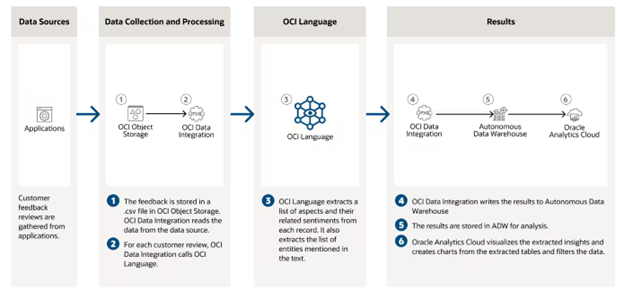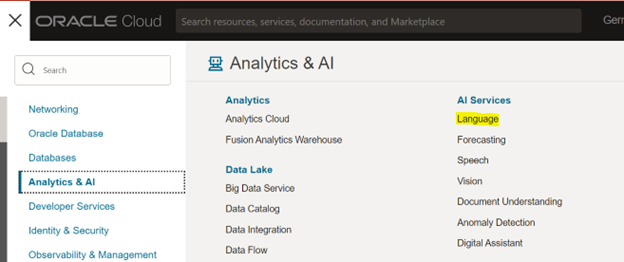What characterizes unstructured data is its lack of adherence to a structured database format, typically consisting of extensive collections of files. While unstructured data does possess an internal structure, it doesn’t adhere to predefined data models.
This data can be either human-generated or machine-generated, and it may exist in textual or non-textual formats. Many businesses that have unstructured data in their possession often seek to extract insights from it in order to fuel their own development and growth. It can be time consuming to analyze a large amount of unstructured data and so many companies adapt Natural Language Processing to gain insights.
However, this approach requires data scientists to build and train custom machine learning models, which costs both excessive time and money. Oracle Cloud Infrastructure (OCI) Artificial Intelligence (AI) Language can support businesses in this area, by using pre-trained models and extracting insights without data science expertise.
OCI AI Language is a cloud-based AI Service for performing sophisticated text analysis at scale. Language services are extremely helpful to gain insights from unstructured data and make important business decisions. OCI Language Services adapts the below architecture to convert unstructured data into meaningful insights.

AI Language services is easily accessible from the OCI Console under Analytics & AI.

Consider this particular scenario involving a customer who has posted a review on a well-known website:
“Just like its name states, the stay was very comfortable. The private property is not just on the beach, but also secluded by rocks that cover each side, so that it’s not open to the general public and you will only find other resort dwellers there. The staff of the hotel are very helpful and friendly, with their smiling faces making our day. They even offered us a DSLR to take our pictures. Besides a welcome drink and a parting tea, our special food requests were also catered to. The rooms on the beach have a pool, shower, reception, sunbeds and a restaurant – all of which are so near that you can comfortably enjoy your stay.”
We have two options in Language service, one is to use the prebuilt model and the other is to train a custom model. With the help of the pre-built model, OCI Language services help us to find the below insights.
Using Prebuilt model:

Once you click Analyze below are the insights generated,
- Language Detection

The model detects your language to be English.
2. Text Classification
Based on the input text it identified the category and subcategory classification.
3. Named Entity Recognition

The model identified and categorized the entities like quantity, people, place, organization, etc.,
4. Key Phrase Extraction

The model extracted the important set of phrases from large blocks of text.
5. Sentiment

The model identified whether the tone and language is positive, negative or mixed. This is extremely critical to make a business decision and to understand the quality of services delivered.
6. Personal Identifiable (PI) information

The model identifies the PI information and can mask the data as per the required format for PI. This step is critical in storing PI related data to meet guidelines for the business.
Conclusion
In this specific scenario, the organization’s Chief Financial Officer (CFO) was granted the authority to make strategic decisions aimed at enhancing the business and propelling it to the next level. To harness user reviews for generating valuable insights, OCI Data Integration is employed. It involves utilizing Language Services as an Application Programming Interface (API) within a data flow job, and the resulting insights are then stored in a table within Oracle Autonomous Datawarehouse (ADW). Business users can access this data and use it to create reports and dashboards with Oracle Analytics Cloud, which can subsequently be presented to the CFO for review. This process enables data-driven decision-making and supports the organization’s growth strategy.
This blog has demonstrated the ability of OCI AI Language Service to make sense of unstructured data, and how this can empower businesses to improve insights and, as a result, the services they offer.
